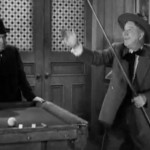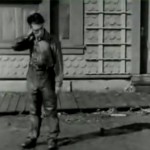
Recently I came across a letter someone sent me after one of my R&R columns from 1991.
In the column I analyzed a particularly bad tape & resume that I received from a disc jockey (whom I didn’t identify).
Yes, “tape.” You’ll also see a reference to an archaic device known as a “typewriter.”
Some highlights:
* The applicant used a grease pencil to scrawl his name on his aircheck cassette.
* The cover letter said, “References on Request.” I pointed out that this is a big pet peeve among PDs. If you have references, include them. Or don’t include them. But there’s no point in telling a prospective employer, “I have references, but you’ll have to ask me for them.”
* The cover letter (that was sent to me) was addressed to “Selection Committee.”
Dear Dan,
Thank you very much for your informative article, “How Not To Apply For A Job” (R&R, May 10). It was right on target, indicating exactly how far out of touch you really are with the difficulty associated with landing a better radio job. As with a number of programmers, consultants, and GMs, your diatribe was laden with what you DON’T want and nothing about what you do want; focusing entirely on the problem without mentioning any solution whatsoever. You’ve left us only, once again, to keep guessing.
Alas, another person claiming to be a “communicator” fails miserably in his communication.
As “The Overnight Guy” at (W___) in top-50 Greensboro, North Carolina, it has been my experience that if you’re not in the “good ol’ boy” network of PD’s, jocks, etc., you’re not “in”, and are reduced from having a human existence with a pulse to being “known” by your resume. Talent, desire and perseverance have nothing to do with it. The individual your article bludgeoned did the best knew how with his five years’ experience. Have you always composed the “perfect resume”? I think not, for no such animal exists. Your degradation of this person as a professional for handwriting on his cassette with a grease pencil is totally inconsistent with his attempt (and I emphasize “attempt”) at being professional in the wording of his cover letter and resume. This guy is merely trying to enjoy this business, make progress in it, and still pay his rent. You arrogantly come across sounding like you’d rather he drop a hundred bucks at the printer’s for personalized die-cut labels!
…Or, even BETTER: an arm, leg, and left nut for one of your seminars!
Regarding the matter of “References Upon Request”: I don’t care if it is ”pet peeve of many PD’s,” I am not going to bandy about the names, addresses and phone numbers of MY references (i.e., colleagues with whom I’ve had a good working relationship) to God-knows-who, without first contacting them and ASKING THEIR PERMISSION to do so! The business changes so rapidly that the reference I might list (according to your criterion) in March may not, for any number of reasons be valid by the time you’re ready to follow-up on it in November. This is yet another inconsistency in your article: If my education and experience catches your interest from my resume, in which you seem to invest so much credibility (you’ve never lied on a resume, have you?), you’re going to contact me anyway, right? You can reasonably ask for references at that time and I’ll give them to you over the phone or mail them to you in another letter. “References Upon Request” gives me an opportunity to sell myself a little more; maybe even thank you for considering me for a job, and allows me to maintain a little control in an uncontrollable situation by letting me know that I’m not farting into a tailwind. By your peeved state at this very common — and PROFESSIONAL — business practice, I can only conclude that you get your chuckles from what people are saying about me behind my back! Even after 15 years’ experience, I’m not so jaded that I will broach the confidence of a co-worker or past or present PD in that way. I suggest that you live with it.
Please continue splitting your insignificant hairs and hacking out your negative articles which pigeonhole those of us with resumes containing words with more than three syl-la-bles as untalented, unprofessional and unworthy of any success in our radio careers. We will continue to get jobs, lose jobs, move up, and try to keep a little humanity and sanity about ourselves for this business. You won’t be missed.
Finally, after you’ve cut our man with the bad resume to shreds, seemingly out of spite because you were referred to as the “Selection Committee” as opposed to, perhaps, “Sir Dan,” or “Your Highness,” you didn’t even have the decency (or is it capability?) to take your massive ego out of overdrive long enough to say ONE WORD about how our boy’s air-check sounded. Was it as good as his resume was “bad”? Did it make you that nervous? Or are you being THREATENED? Your priorities here are totally confused and your lack of comment on this is conspicuous by its absence.
That, in my most PROFESSIONAL opinion and utmost candor, CHAPS MY ASS!
Sincerely,
( )
Dear Mr. ( ),
1. I am aware that landing a better radio job is fraught with difficulty. People whose presentations make as poor an impression as the one I wrote about are likely to experience more difficulty than is necessary.
2. Regular readers of my column have not been left to “keep guessing” what PDs do want. I’ve written regularly and often on the subject in painstaking detail…including a multi-part series entitled “The Radio Job-Hunting Survival Guide.”
3. In my experience, most people send tapes & resumes in the hopes of getting a job, not as a means of having one’s human existence validated.
4. Most program directors prefer to hire people who act professionally — not people who unsuccessfully “attempt” to do so.
5. Spending $100 for die-cut labels is one alternative to scribbling one’s name with a grease pencil. Another alternative is to use a typewriter and a plain cassette label. I believe the latter suggestion is the cheaper of the two.
6. My next seminar runs two very long, full days. The registration cost is $179. If that represents to you an arm, leg and left nut, then you place a far lower value on your nuts than I do on mine.
7. A job-seeker who doesn’t “care if it is a pet peeve of many PDs” is a fool.
8. If you wish to list references, you can get permission from the people on your list before including it with your package. Also, you seem to miss the fact that I did not insist that references be included in the resume package. I said, “Either list your references or don’t.”
9. If business changes cause changes in your list of references, you can edit the list as needed and only send out the current, up-to-date list at any given time.
10. Fortunately, I don’t have to “live with” unprofessional tapes & resumes. The only person who does is the one who mails them to prospective employers. After 15 years in radio, you have been fortunate enough to have risen to an overnight position in Greensboro, North Carolina. Others who hope to attain or even exceed your success can help themselves by making their first impression as positive as possible.
11. I didn’t discuss the content of the aircheck because it was irrelevant to the article. I already have written extensively about aircheck contents; this piece was devoted to packaging, not content.
Best,
Dan O’Day






